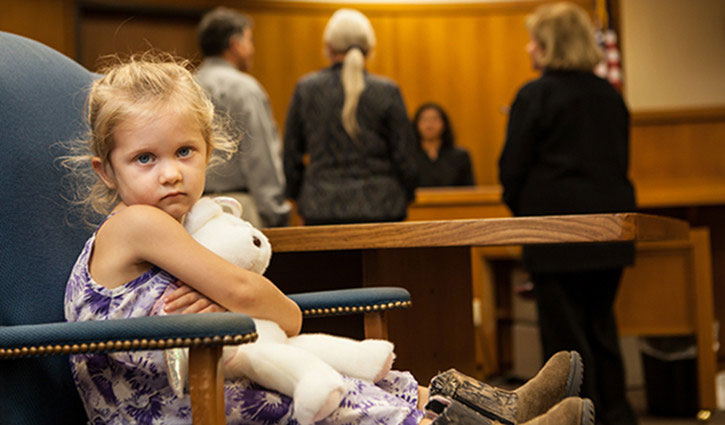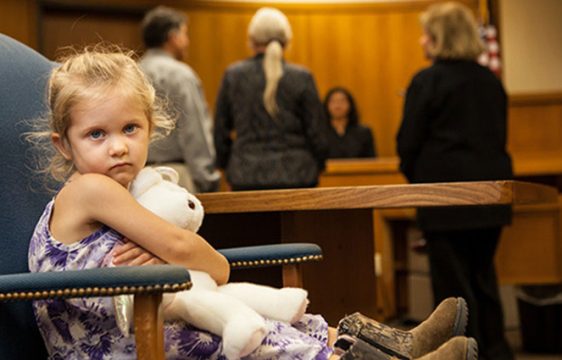Preparation for Custody Hearings (Part 1)

A Maryland family court making child custody decisions makes two mutually exclusive determinations: 1) legal custody (a determination of which parent may make decisions regarding the health, education, religion and welfare of the child); and 2) physical custody (who the child will reside with).
The trial judge has the authority to determine custody, regardless of whether “joint custody has existed in the past, or award custody to one of the parents, or to a third person, depending upon what is in the best interests of the child.” Taylor v. Taylor, 306 Md. 290, 301, 508 A.2d 964 (1986).
The Court of Appeals in Taylor, 306 Md. at 296, 508 A.2d 964, stated:
Legal custody carries with it the right and obligation to make long-range decisions involving education, religious training, discipline, medical care, and other matters of major significance concerning the child’s life and welfare.
In Taylor, the Court went on to state that “joint legal custody means that both parents have an equal voice in making those decisions, and neither parent’s rights are superior to the other.” In determining the propriety of joint custody, the Court opined that “joint custody is not appropriate in every case. Indeed, it has been suggested that it is appropriate only in a small minority of cases.” Taylor, 306 Md. at 302–03, 508 A.2d 964. The most important factor in determining whether an award of joint legal custody is appropriate is the capacity of the parents to communicate and to reach shared decisions affecting the child’s welfare. According to the Taylor Court:
[r]arely, if ever, should joint legal custody be awarded in the absence of a record of mature conduct on the part of the parents evidencing an ability to effectively communicate with each other concerning the best interest of the child, and then only when it is possible to make a finding of a strong potential for such conduct in the future.
Taylor, 306 Md. at 304, 508 A.2d 964.
While most matters reviewed and adjudicated in a divorce proceeding are reviewed as a matter of equity,[1] child custody is based on the “best interests” of the minor child and not a consideration of the parent’s rights. See Md. Ann. Code, Family Law Article § 1-201(a); Montgomery County Dep’t of Social Services v. Sanders, 38 Md. App. 406, 381 A.2d 1154 (1978); Wagner v. Wagner, 109 Md. App. 1, 37, 41, 674 A.2d 1 (1996). In other words, while a parent may say, “I have a right to see my child” (an equity argument), that is not consistent with child custody law in Maryland.
One judge has stated that “[t]he bottom line in any custody dispute is: what is in the ‘best interests’ of the children?; and a judge agonizes more about reaching the right result in a contested custody issue than about any other type of decision he renders. The agony is complicated even more when both parties are dedicated and devoted… .” Leary v. Leary, 97 Md. App. 26, 37, 627 A.2d 30, 35 (1993) (internal citation omitted). In any divorce or custody action where the custody of a child or children is being disputed, the court has a myriad of factors that it must consider in determining child custody.
The following is a list of factors that the Court may take into consideration in determining the best interest of minor children to determine custody and access. (There is some repetition in cases where a factor is relevant to different areas of inquiry.) Of course, each family is different and each custody case is different as well. An experienced family law attorney will discuss these factors set forth in Maryland case law [2] with you and any application the factors may have upon your case:
1. Fitness of Parents
Involvement of children in divorce process
Denigration of other parent
Parental alienation of child from other parent
Exposure of children to adulterous behavior
Time requirements of employment
Travel requirements of employment
Inability to hold a job
Frequent job changes
Lack of stability
Frequent changes of address
Irresponsibility – financial and otherwise
Excessive use of alcohol
Use of illegal drugs (CDS)
Abuse of prescription drugs
Violence toward spouse or children
Quick temper
Profanity
Poor housekeeping
Age, infirmity, and disability
History of mental or emotional illness
Suicide threats or attempts
General level of maturity
Educational achievements
2. Role to Date of Each Parent in Nurturing and Raising The Child
Who shops for food, cooks, cleans, does laundry?
Who makes and takes child to dental and medical appointments?
Who transports the child to school, activities, etc.?
Who attends school and extra-curricular activities?
Who puts child to bed?
Who reads to the child?
Who assists with homework?
Who takes the child shopping for clothing?
Who disciplines the child?
Who participates in religious activities with the child?
Who takes care of the home?
3. The Relationship of the Child to Each Parent
Is the child fearful of the parent?
Does the child confide in the parent?
Does the child respect the parent?
Does the parent respect the child?
What is the level and extent of communication between parent and child?
How does the child react to discipline from the parent?
4. The Child’s Preference
How old is the child?
Has the child been pressured into a “preference”?
To whom and under what circumstances has the preference been expressed?
5. The Home, School and Community Environment
Will the child be involved in school activities where he or she will be living?
Little League, ballet, soccer?
Are there kids their age in the community?
Will school or parents be able to meet special needs?
Is the child involved in clubs, e.g. Boy Scouts?
Is the location of the home suitable for children?
What is the location of school child will attend?
Does the school provide special programs?
Are there concerns for safety of the child in the neighborhood or at school?
6. The Availability of Support Systems of Each Parent
Friends
Religious groups
New spouse and step-children
Grandparents
Other family members
Mental health professionals
Neighbors
7. The Lifestyle of Each Parent as a Role Model
Occupation and work habits (such as balance between good worker and workaholic)
Involvement in the community
Involvement in church
Abuse or excessive use of alcohol, drugs
Responsibility – who made decisions in marriage?
Social life (hours kept)
Exposure of child to new love interests
Personal cleanliness
Cleanliness of home
8. Accessibility to Extended Family in Each Living Situation
Where are grandparents, aunts, uncles, cousins geographically?
Historical involvement of extended family members
9. Attitude of Each Parent Towards Visitation
Which parent is more likely to allow child continued contact with the other parent?
Has a party interfered with visitation with the child in the past?
Is there a history of visitation disputes?
Have there been any issues with telephonic visitation or access?
10. The Age and Sex of Each Child
Boy/Girl
Age
Level of maturity
Relative ages of all children
11. Stability and Mental Health of Each Parent
Responsibility
Suicide threats or attempts
Depression
Indications of mental or emotional illness
Alcohol or drug abuse
12. Stability and Mental Health of Each Child
Any special needs of child
Willingness to recognize special needs of child
How can each parent meet special needs
13. Preservation of Status-Quo
What are the present living arrangement?
How long has this arrangement been in place?
How was the living arrangement created, e.g., agreement between the parties, Court Order, desertion by one party, etc.
14. Each Parent’s Plans for Day-to-Day Child Care
Child care arrangements (babysitters)
Daily living patterns (work hours, work-related travel)
15. Each Parents Goals and Values
Career goals/rehabilitation
Educational goals
Personal goals
Family goals
Priorities
Church attendance
Involvement in civic activities, charities, etc.
16. Willingness & Cooperation to Include Other
Is the parent involved in the lives of the children?
Does the parent assist in making decisions (before separation and after)?
Does the parent keep the other informed on activities, failures, achievements?
17. Potential for Maintaining Natural Family Relations
With grandparents
With brothers & sisters (split custody)
How far apart will the parents be living from each other?
18. Willingness to Provide Support & Maintenance of Child
Incomes of the parties
Assets of the parties
Which parent can meet special financial needs?
Has other parent been providing support?
Has litigation been necessary to obtain support?
Arrearages incurred due to withholding or non-payment of support?
19. Prior Voluntary Abandonment or Surrender
Did a parent leave the home without the children?
How often does the parent visit/contact children?
20. Desire for Cooperative Parenting Agreement Between Parties
Ability, willingness of parents to negotiate outside of court
Ability to be reasonable/fair
Antagonistic attitude
21. Character & Reputation of Parties/Witnesses
Grandparents, friends, relatives
Teachers, school personnel
Coaches
Neighbors
Parents of child’s friends
Babysitters
Clergymen
22. Involvement of Each Parent in the Child’s Life
23. Which Parent Is Best Able to Meet Non- Financial Special Needs Of Children
24. Professional Opinions re: Custody
Psychologists previously involved or post-separation
Psychiatrists
Social Workers
To whom is the child most “bonded” psychologically?
Is parent emotionally dependent on the child?
Is child emotionally dependent on the parent?
[1] A “system of law originating in the English chancery and comprising a settled and formal body of legal and procedural rules and doctrines that supplement, aid, or override common and statute law and are designed to protect rights and enforce duties fixed by substantive law.” Merriam Webster Dictionary, Equity.
[2] See Taylor v. Taylor, 306 Md. 290, 508 A.2d 964 (1986) and Montgomery County Dep’t of Social Services v. Sanders, 38 Md. App. 406, 381 A.2d 1154 (1978).
